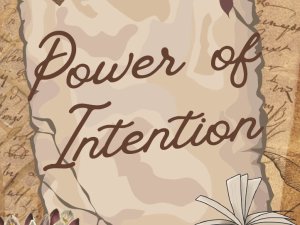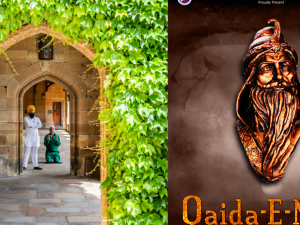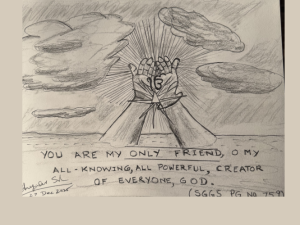“ਗਾਉ ਗਾਉ ਰੀ ਦੁਲਹਨੀ ਮੰਗਲਚਾਰਾ ॥ ਮੇਰੇ ਗ੍ਰਿਹ ਆਏ ਰਾਜਾ ਰਾਮ ਭਤਾਰਾ ॥1॥ ਰਹਾਉ ॥”
“Gaau gaau ree dhulahanee ma(n)galachaaraa. Maerh gireh aae raajaa raam bhataaraa.1.Rahaau.” (SGGS, Pg. No.482)
Translation: Sing, sing, O brides of the Lord, the marriage songs of the Lord. Raam, my King, has come to my house as my Husband.
This is a very bold statement by the weaver and bhagat, Kabir Ji, and this should not to be taken in the biological context of marriage. The statement is in a purely metaphorical context. Here Kabir Ji considers self as the bride, and God as the bridegroom. This metaphor has been traditionally employed by devotees to refer to themselves as female and refer to divine as the male. In their thinking all human beings are bride and God is sole bridegroom. It is a declaration of the ultimate achievement of purpose of life. In fact it is Kabir Ji’s expression of the experienced communion. Just as the bride at the time of wedding, dresses in red color, Kabir Ji says that his body is filled with God in every fiber and cell just as dye flows into and permeates the fibers of the cloth.
“ਤਨੁ ਰੈਨੀ ਮਨੁ ਪੁਨ ਰਪਿ ਕਰਿ ਹਉ ਪਾਚਉ ਤਤ ਬਰਾਤੀ ॥ ਰਾਮ ਰਾਇ ਸਿਉ ਭਾਵਰਿ ਲੈਹਉ ਆਤਮ ਤਿਹ ਰੰਗਿ ਰਾਤੀ ॥1॥”
“Tun rai-nee mun pun rap kar hau paachau tat baraatee. Raam rai siau bhaavar laihau aatam teh rung raatee.1.” (SGGS, Pg. No.482)
Translation: I make my body the dying vat, and within it (Naam is water, devotion is the dye), I dye my mind (dye of virtues, red in color of love). I make the five virtues my marriage guests [Truth (=Sat), Contentment (=Santokh), Compassion (=Daya), Righteousness (=Dharam), Spiritual Virtues (=Daivee Gun as Humility (=Nimrata etc.)]. I take my marriage vows with Raam, my King; my soul is imbued with His Love.
Now after the welcoming reception of the barat (the bride’s party), it is time for actual ceremony. For the wedding ceremony Kabir Ji says:
“ਨਾਭਿ ਕਮਲ ਮਹਿ ਬੇਦੀ ਰਚਿ ਲੇ ਬ੍ਰਹਮ ਗਿਆਨ ਉਚਾਰਾ ॥ ਰਾਮ ਰਾਇ ਸੋ ਦੂਲਹੁ ਪਾਇਓ ਅਸ ਬਡਭਾਗ ਹਮਾਰਾ ॥2॥
“Naabh kamal meh bedhee rach le braham giaan auchaaraa. Raam rai so dhoolahu paio as baddabhaag hamaaraa. 2.” (SGGS, Pg. No.482)
Translation: In the lotus of my breath I have made my bridal pavilion, and the Mantras of divine wisdom are being chanted to solemnize the wedding. I have obtained King Raam as my Husband - such is my great good fortune.
“ਸੁਰਿ ਨਰ ਮੁਨਿ ਜਨ ਕਉਤਕ ਆਏ ਕੋਟਿ ਤੇਤੀਸ ਉਜਾਨਾਂ ॥ ਕਹਿ ਕਬੀਰ ਮੋਹਿ ਬਿਆਹਿ ਚਲੇ ਹੈ ਪੁਰਖ ਏਕ ਭਗਵਾਨਾ ॥3॥2॥24॥”
“Sur nar mun jan kautak aae koat tetees aujaanaa(n). Kaeh Kabeer moh biaaeh chale hai purakh ek bhagavaanaa. 3.2.24.” (SGGS, Pg. No.482)
Translation: The angels, holy men, silent sages, and the 330,000,000 deities have come in their heavenly to witness this spectacle. Says Kabeer, I have been taken in marriage by the One Supreme Being, the Lord God.
Kabir Ji, had earlier used the words like Raja Raam, Raam Rai for God, but the word Raam which could be implied for the seventh avatar of Vishnu, known as Raam, the son Dasrath. Now in the last line he clarifies leaving no doubt, that Raam that he referring to is the omnipresent Supreme Being.
For the doubters of this interpretation Kabir Ji has also clarified elsewhere as:
“ਹਰਿ ਮੇਰੋ ਪਿਰੁ ਹਉ ਹਰਿ ਕੀ ਬਹੁਰੀਆ ॥”
“Har mero pir hbau har kee bahureeaa.” (SGGS, Pg. No.483)
Translation: Har is my Pir (master) and I am the Lord's bride.
Now, let us ask Kabir Ji to share with us how this was achieved? He answers by saying:
“ਤਨੁ ਮਨੁ ਧਨੁ ਗ੍ਰਿਹੁ ਸਉਪਿ ਸਰੀਰੁ ॥ ਸੋਈ ਸੁਹਾਗਨਿ ਕਹੈ ਕਬੀਰੁ ॥3॥23॥”
“Tun mun dhan girahu saup sareer. Soiee suhaagan kahai kabeer.3.23.” (SGGS, Pg. No.328)
Translation: One who surrenders her body, mind, wealth, home and self - she is the true soul-bride, says Kabeer.
Kabir Ji says that he gave a new construct to his mind and body with Naam. The Naam permeated his inner mind and it gave birth to love for divine. Let us ask Kabir, can you share with us what is the feeling of this experience and the achievement? Kabir Ji provides the answer:
“ਰਾਮ ਕਬੀਰਾ ਏਕ ਭਏ ਹੈ ਕੋਇ ਨ ਸਕੈ ਪਛਾਨੀ ॥6॥3॥”
“Raam Kabeera aek bhaae hai koe n sakai pashhaanee.6.3” (SGGS, Pg. No. 969)
Translation: Raam and Kabeer have become one. No one can tell them apart.
Here, we see Kabir Ji is declaring that he has become one with God and no one can distinguish between them. Now, he is enjoying celestial bliss and will not be reincarnated again. He shares with us the blessed feeling of this blessing:
“ਧੰਨਿ ਸੁਹਾਗਨਿ ਜੋ ਪੀਅ ਭਾਵੈ ॥ ਕਹਿ ਕਬੀਰ ਫਿਰਿ ਜਨਮਿ ਨ ਆਵੈ ॥3॥8॥30॥”
“Dha(n)n suhaagan jo peea bhaavai. Kaeh kabeer fir janam na aavai. 3.8.30.”
(SGGS, Pg. No.483)
Translation: Blessed is the soul-bride who is pleasing to her Husband Lord. Says Kabeer, she shall not have to be reincarnated again.
Becoming the bride of God is merging with God and it is the ultimate purpose of human life. Kabir Ji attained it, and he has shared his experiences for our inspiration.
References:
- www.Sikhitothemax.com
- Singh, Bhai Vir. Santhya Sri Guru Granth Sahib Ji, Volume 6
- Singh, Prof. Sahib. Sri Guru Granth Sahib Darpan, Volume 3
- Das, Nirmal. Songs of Kabir from the Adi Granth
- Dharwadkar, Vinay. Kabir The Weaver’s Songs
Related Articles:





